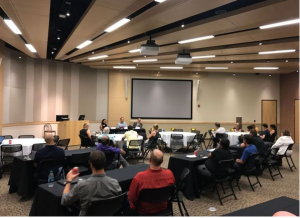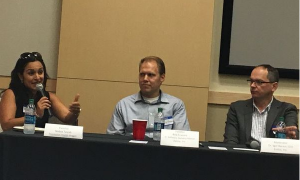HTF Phoenix Meetup 7/20/17: Artificial Intelligence Disruption in Healthcare
HTF Phoenix hosted its July Meetup at the Barrow Neurological Institute’s Sonntag Pavilion, sponsored by The Medical Memory. We had an incredible talk on Artificial Intelligence disrupting healthcare by synthesizing better outcomes at lower costs. The talk included two amazing speakers, Dr. Igor Barani and Bob Fraseur, with Nadaa Taiyab moderating the discussion. Igor Barani, MD, is the director of the Artificial Intelligence Center and an associate professor in the Department of Neuro-Radiation Oncology at Barrow Neurological Institute. He is board certified in radiation oncology by the American Board of Radiation Oncology. Bob Fraseur is the Senior Software Delivery advisor for Cigna.
Around 45 members attended the event and engaged with the speakers and everyone on various topics. The talk covered a lot of different topics ranging from how AI is revolutionizing diagnostic health care to deep learning and transfer learning to identifying and finding data sets to train models and finally ended on the ever hot topic of how AI and automation might put people out of jobs.
The event attracted care advocates, physicians, entrepreneurs, and healthcare technology professionals. Dr. Barani shared interesting insights that as healthcare systems are becoming increasingly digitized, the opportunity for machine learning to empower radiologists will increase exponentially. He shared insights from his work at Enlitics, an AI startup company, about how they deployed deep-learning technology into CT scans and X-rays in imaging centers in the US, Australia, Asia and beyond to identify malignant tumors. He shared a story of a test against three expert human radiologists working together, Enlitic’s system was 50% better at classifying malignant tumors and had a false-negative rate (where cancer is missed) of zero, compared with 7% for the humans. Another of Enlitic’s systems, which examines X-rays to detect wrist fractures, also handily outperformed human experts.
Bob Fraseur then enlightened the audience about his group work at Cigna. He spoke about how they used training data to create a model and was successfully able to determine fraud and abuse in claims data. While the audience was captivated with information presented to them, they all had a common question regarding identifying and finding training data. Our speakers educated the audience that training data can be anywhere from data in excel spreadsheet to large data sets. They also provided some sources where we can get data sets for free to train our models.
The talk ended with the discussion how AI might be replacing physicians and radiologist and eventually put them a job. While both speakers commented that while it’s too soon to talk about replacing physicians, AI and deep learning algorithms would augment their skills and help to detect malignant tumors quickly. In the end, speakers agreed that we’re approaching a transformative moment where artificial intelligence and deep-learning will reshape the entire healthcare industry.
Big Data processing is beyond the scope of human mind and in healthcare, delivering adequate t reatment promptly is critical. Applying AI could support diagnostic and therapeutic decision making, bring down drugs’ time to market, empower patients and accelerate discovery and innovation.
reatment promptly is critical. Applying AI could support diagnostic and therapeutic decision making, bring down drugs’ time to market, empower patients and accelerate discovery and innovation.
Presenting Companies
Medical Memory is an HIPAA-compliant app that allows doctors to save time and limit risk by seamlessly pushing video content to patients. Physicians can utilize Medical Memory to video record patient consultations and office visits, send one-way video messages during rounding or discharge or to create their own stock video library of prerecorded videos for enhanced consents, surgery logistics, conflicts of interest and more. Patients can access videos in a secure web portal and share with their continuum of care, and physicians can share videos with other healthcare providers to extend communication within multidisciplinary teams. Medical Memory improves patient engagement and compliance without any disruption to existing workflows.
Medtexter empowers patients to manage and remember to take their medications on time. When they forget, Medtexter engages them, their family members, and their healthcare providers, to prevent unnecessary healthcare costs and improve health outcomes.
DeeveHealth prevents or delays Type 2 Diabetes for people who are pre-diabetic using a mobile solution in a combination of behavioral psychology with strong peer group support, wireless device, and health coach. Our user Ven, who is pre-diabetic with A1C of 5.8 went through our program and able to reduce the A1C to 5.5. Which is a significant change without using any prescribed medication



